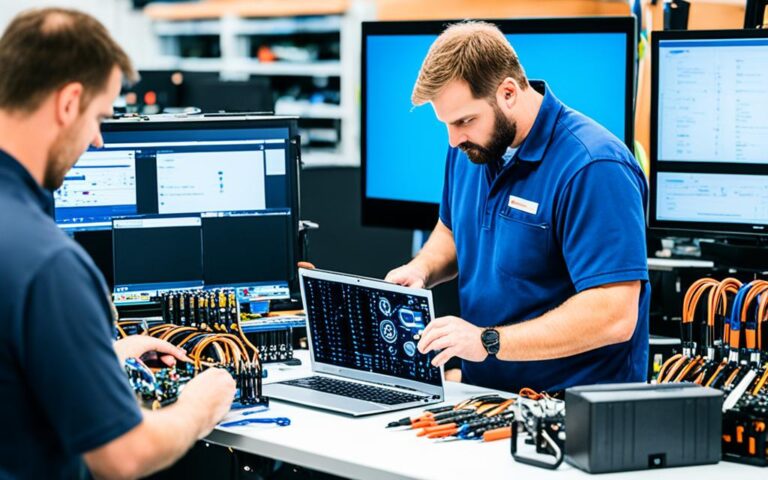Technology has changed our lives a lot in 2024. It helps make transport safer and more efficient, gives us better access to food and healthcare, and helps us stay connected with others. It makes learning easier and lets us join global communities online1. But, we also worry about how much technology we use and its effects on our mental health, social life, and privacy.
Computing innovations have made it easier to talk to each other. Now, we can message, video call, and share our lives on social media. This has brought people closer together and helped us work together across the globe2. But, it’s important to keep having real-life chats too, not just online ones.
AI is changing how we work. It can do many tasks that humans used to do, making us more efficient and productive. A survey found that many business leaders are thinking about using AI instead of hiring more people1. This means we can focus on creative tasks while AI does the routine work. But, we must use AI in a way that doesn’t take away jobs from people.
Computing innovations have also raised privacy concerns. With more of our personal info online, there’s a bigger risk of privacy breaches and identity theft. In 2022, many people switched companies to protect their privacy1. We need to be careful with our online data to stay safe.
Shopping has become easier thanks to technology. We can now shop online from home and find lots of products. AI also helps by suggesting products we might like, based on what we’ve looked at before2.
Computing innovations have made getting information easier too. The internet lets us access knowledge from all over the world. This has changed education, offering online courses and personalized learning3. But, we should always check the info we find online to make sure it’s true.
Now, many of us have virtual social lives. Social media lets us stay in touch with friends and family, no matter where they are. These online communities offer support and a sense of belonging. But, it’s key to balance our online and real-life social lives to keep our mental health good.
More people are working from home because of technology. This gives us more freedom and helps us have a better work-life balance. By mid-2022, 35% of Americans could work from home full-time1. It’s important to set clear boundaries between work and home to avoid burnout.
The idea of a shorter workweek is becoming popular, thanks to technology. With automation, we can do tasks faster, so we might not need to work as long. A shorter week could mean a better balance between work and life, less stress, and happier employees3.
In conclusion, computing innovations have changed our lives a lot. They’ve improved how we talk, work, shop, and find information. While there are worries about privacy and too much technology, used right, it can make our lives better in many ways23.
Key Takeaways:
- Computing innovations have changed our lives, making communication, work, and information access better.
- These advancements raise concerns about privacy and the use of technology.
- Online shopping and virtual social lives are now big parts of our daily lives.
- Remote work and shorter workweeks offer more flexibility and a better balance between work and life.
- Used responsibly, computing innovations can improve our productivity and convenience.
Improved Communication
Technology has changed how we talk to each other, making it quicker and easier. Now, we have many ways to stay in touch, like instant messaging and video calls. These changes have made our conversations better in both our personal and work lives.
Video calling has been a big step forward. Tools like Zoom, Skype, and FaceTime are now very popular. They let people from all over the world talk face-to-face, even if they’re far apart. This has made working together and staying close to loved ones easier.
Thanks to new tech, we can talk to almost anyone, anywhere4. Sites like FaceTime, Facebook, and WhatsApp have made sharing news and ideas fast and easy. This has made our lives more connected and our work more efficient.
Text messaging and social media have also changed how we talk. They’ve made phone calls less common, offering a quick way to share news and photos. This has made keeping up with friends and family simpler.
Technology has also changed how we get news, giving us updates as they happen4. Journalists can share news quickly, keeping us informed about what’s going on. This has made it easier for us to understand the world around us.
Thanks to technology, the world feels closer. It’s easier to talk to family, work together, or keep up with news. Technology has made communication better, faster, and available to everyone.
Benefits of Improved Communication through Technology:
| Benefits | Statistics |
|---|---|
| Instant and convenient communication | According to statistical data5, instant and glitch-free communication has dramatically changed the way people communicate with various modes of electronic communication such as smartphone communication and social media. |
| Enhanced connectivity and collaboration | Thanks to platforms like Zoom, FaceTime, and Skype, individuals can connect face-to-face regardless of their geographical location, promoting effective collaboration and fostering a sense of connection. According to statistical data4, communication innovations have made it possible to communicate instantly to nearly anyone around the world. |
| Real-time updates and information dissemination | Innovative communication technologies have accelerated the news cycle, leading to real-time updates in journalism across various media platforms. According to statistical data4, communication technologies have enabled instant communication and information exchange through platforms like FaceTime, Facebook, and WhatsApp. |
Technology has brought many benefits to us all. It has made our relationships stronger and changed how businesses work. The growth in communication technology has truly changed how we connect and interact with the world.
AI Changing The Way We Work
AI technology, especially ChatGPT, has changed how we work in many ways. It automates tasks like data analysis and content creation. This tool is now used by companies and individuals, making tasks easier and more efficient. It has made industries more efficient and productive worldwide6.
In manufacturing, AI has changed the game. It makes production faster, more accurate, and consistent. Intelligent machines do tasks that were once slow and prone to mistakes. This has made operations smoother and helped companies meet demands easily6.
Customer service has seen a big change with AI chatbots. These virtual assistants work all the time, easing the load on human staff. Customers get quick help and solutions, and businesses see better efficiency and customer happiness6.
The transport sector has also seen big changes with AI. Autonomous vehicles are now a thing, offering more efficiency, saving costs, and making roads safer. AI helps these vehicles make quick decisions, reducing accident risks and improving traffic flow6.
But, there are worries about job losses due to automation. Some jobs are more likely to be automated because they involve repetitive tasks. While AI brings many benefits, we need to think about how it affects jobs and help workers adjust6.
https://www.youtube.com/watch?v=bHb_eG46v2c
AI Changing The Way We Work
AI technology, including ChatGPT, has changed how we work across industries. It automates tasks, making us more efficient and productive. This means we have more time for complex and strategic tasks. As AI gets better, we can expect even more improvements in different sectors67.
| Statistics | Industry Impact |
|---|---|
| Use of AI in many sectors of business has grown by 270% over the last four years8. | AI-powered automation has significantly increased efficiency and productivity. |
| 90% of leading businesses already have ongoing investment in AI technologies8. | Companies are recognizing the value of AI and investing in its implementation. |
| More than half of businesses that have implemented AI-driven technology report experiencing greater productivity8. | AI has led to improved productivity and streamlined operations. |
| Attacks on cybersecurity rose 600% during the pandemic in 20208. | AI can play a crucial role in enhancing cybersecurity measures and protecting sensitive data. |
| Up to 75% of resumes are rejected by automated applicant tracking systems (ATS) before reaching a human8. | AI-driven ATS systems assist in efficient filtering of resumes, saving time for recruiters. |
| Recruiters can spend up to 23 hours looking over resumes for one successful hire8. | AI can automate the resume screening process, allowing recruiters to focus on higher-value tasks. |
| In 2018, 67% of hiring managers stated that AI was making their jobs easier8. | AI technology simplifies tasks and improves efficiency for hiring managers. |
Decreased Privacy
In today’s digital world, privacy is a big worry for many. This is because we share a lot online and face risks of data breaches and cyber attacks. With so much personal info online, we’re more open to threats than ever.
Data breaches happen often, putting millions of people’s info at risk. This can lead to serious issues for individuals.
Less privacy affects many parts of our lives. For instance, having an arrest record can hurt job chances, even if the charges were dropped9. This can really impact someone’s career and future.
Being watched online can make us feel trapped. It can stop us from being ourselves9. This fear makes us think twice before doing anything online, limiting our freedom.
Privacy issues can lead to blackmail and extortion, as our personal info is shared without our consent9. This can harm not just us, but our families too. It shows how vital it is to keep our data safe.
Our personal info is like a part of us. Losing privacy means losing control over our lives9. It affects our ability to make choices and live our lives as we want.
But, there are ways to keep our online life private. Using virtual private networks (VPN) is one way to encrypt our internet use and hide our data9. VPNs make our online actions safe and private by encrypting our connection to the internet.
Overall, the loss of privacy in our digital lives is worrying. It’s important for us to know the risks and protect ourselves. Using VPNs and being careful with our online info is key.
Accessible Shopping
Technology has changed how we shop, making it easier and more accessible. Now, with online shopping and contactless payments, buying things is smoother than ever.
Online shopping has become a big hit thanks to platforms like Amazon. Now, shoppers can look at products, compare prices, and read reviews from home. This has changed how we shop, making it unnecessary to go to physical stores.
Contactless payments have also changed the way we pay. With mobile wallets and apps, paying is quick, safe, and clean. This saves time and keeps us safe during the pandemic and after.
Online shopping and contactless payments have changed how people shop. A Tech.co survey found that almost half of business leaders might use AI instead of hiring more staff10. This move is because they want to give customers a smooth and easy shopping experience.
“Technology has made shopping not just easier but also more tailored to us. With advanced algorithms, shops can suggest products we might like based on what we’ve looked at and bought before. This makes shopping more enjoyable and keeps customers coming back for more.”
Self-checkout options are another big change in shopping. Almost 90% of people like these options in stores11. They let shoppers pay for their items without waiting in line, making shopping quicker and more independent.
Overall, technology has made shopping more accessible and convenient. With new tech coming out all the time, shopping is getting better for everyone around the world. We can look forward to even more ways to make shopping easy and fun in the future.
| Statistic | Data |
|---|---|
| Ecommerce’s share of retail sales (early pandemic) | 19% |
| Ecommerce’s share of retail sales (2022) | 15% |
| Omnichannel customers spend more | McKinsey data |
| Customers likely to make a purchase with personalized experience | Epsilon research |
| Consumers happy with retailers offering self-checkout options | Almost 90% |
| AI-powered checkout technology for autonomous stores | AiFi, funded by HP Tech Ventures |
| Retail IT service provider for retail forecasting | VINX, using HP Z8 G4 Data Science Workstation paired with NVIDIA GPUs |
| Computer vision technology and AI image recognition in retail stores | Vispera |
Better Information Access
The internet has changed how we find information, making learning easier and more accessible. It connects over 50,000 networks, 4 million systems, and helps 70 million users worldwide12. This makes it a key tool for daily life, letting us tap into vast knowledge from top institutions globally.
Web 2.0 brought social media and new ways to talk online12. These tools connect people worldwide and share information like never before. Now, learning is more interactive, letting us talk with experts and peers easily.
Smartphones and tablets have made the internet mobile12. We can find information anywhere, anytime. This has made learning flexible and easy, fitting into our busy lives.
In education, the internet has opened new doors12. Online courses and e-learning make education available to everyone. This has made learning more inclusive, helping more people get the skills they need.
But, the internet and social media raise privacy concerns12. Protecting personal data, especially for kids, is now a big issue. We must balance the benefits of information access with privacy and security.
The internet has changed how we learn, breaking down barriers in education. As we move forward, using the internet wisely is key. We must protect privacy and security while enjoying its learning benefits.
https://www.youtube.com/watch?v=LzaGyahoieI
| Statistics | Impact |
|---|---|
| Approximately 77% of professionals believe that online learning helps them improve their skills and advance their careers13. | Online learning has become an increasingly valuable tool for professionals seeking self-improvement and career advancement. |
| Networking platforms have enabled individuals to expand their professional network by an average of 40% more connections than traditional networking methods13. | Networking has become more efficient and extensive, enabling professionals to connect with a broader range of contacts. |
| Organizational tools, such as project management software, have resulted in a 25% increase in workplace organization efficiency13. | Workplace organization has improved significantly, leading to enhanced productivity and streamlined operations. |
| Technology has increased overall workplace productivity by an average of 30% through automation and digital collaboration tools13. | Technological advancements have significantly boosted workplace productivity, enabling tasks to be completed more efficiently. |
| Conducting research online has led to a 45% reduction in time spent waiting for external information sources13. | Online research has expedited the acquisition of information, saving time and improving efficiency. |
| Infographic resumes have shown to increase job interview callbacks by 20% due to their engaging visual presentation13. | Utilizing infographic resumes can significantly enhance job applicants’ chances of securing job interview opportunities. |
| Job search using technology has made it possible for professionals to apply for jobs from anywhere, resulting in a 35% increase in the number of job applications submitted13. | Job seekers now have the flexibility to search and apply for job opportunities remotely, expanding their options and chances of success. |
| Time management apps and tools have helped professionals improve their punctuality by an average of 50% for appointments and meetings13. | Time management tools have been instrumental in enhancing professionals’ punctuality and ensuring efficient use of time. |
Virtual Social Lives
Technology has changed how we connect and interact with others. Now, we can form global networks and build relationships online easily. This has broken down barriers of distance and culture.
Social media lets us stay close to our loved ones, no matter where they are. We can share updates, photos, and memories easily. It’s like having a virtual space where we can feel connected and involved with our friends and family.
Online communities have also changed our social lives. They bring people together who share similar interests. These communities offer a sense of belonging and let us connect with others who share our passions.
The COVID-19 pandemic has shown how vital virtual socializing is. Social media and online communities kept us connected during tough times. They gave us a sense of normalcy and support when we needed it most.
Virtual socializing has also changed how businesses and brands connect with people. Social media is a powerful tool for marketing. It lets companies talk directly to their customers and build loyalty. Online communities help brands engage with their audience and get feedback.
Overall, virtual socializing is a big part of our lives now. It has changed how we socialize, build relationships, and interact with the world. Through social media and online communities, we can connect, share, and work together on a global scale. And as technology gets better, so will our chances to socialize online.
Virtual Social Lives Table
| Statistics | Source |
|---|---|
| An overwhelming share of participants in the discussion reported that digital life enhances various aspects of work, play, and home life14. | Link 3 |
| The internet has revolutionized different dimensions, from intellectual experiences to mundane daily activities such as communication, analysis, and collection of data14. | Link 3 |
| Nearly every member of families utilizes the internet for improving their well-being, including aspects like diet, fitness, health, social interactions, education, and entertainment14. | Link 3 |
| Individuals engage in private communications across continents effortlessly, receiving news updates, interacting with family and friends online, and managing financial transactions and investments globally14. | Link 3 |
| Access to messaging apps facilitates personal connections, providing a platform for seeking advice, sharing life challenges, and forming supportive relationships14. | Link 3 |
| Social media platforms facilitate continuous connections with family members, promoting closeness and involvement, resembling the effects of real-life interactions and fostering emotional well-being14. | Link 3 |
Virtual socializing is now a big part of our lives. It has changed how we connect, interact, and build relationships. Through social media and online communities, we can stay close to our loved ones, form global networks, and have meaningful interactions. The impact of virtual socializing is huge, changing personal relationships, business, and society as a whole.
Remote Working
Remote work has become more popular in recent years, especially during the COVID-19 pandemic. Now, working from anywhere is common, thanks to tech and connectivity. Tools like Zoom help teams work together and stay in touch.
Remote work has many benefits. It makes people more productive and engaged15. It cuts down on commuting and lets people manage their time better. Companies can also find talent from anywhere16.
But, remote work has its challenges too. It can be hard to talk and share ideas when teams are far apart. Finding ways to build team spirit is important15. Managing work and keeping data safe can also be tricky15. Yet, companies like GitLab and Zapier show how to overcome these issues15.
Employers need to change how they manage remote teams16. Training managers to lead remote teams is key. The way remote work affects company culture is still being studied. It brings both challenges and chances for teamwork and new ideas16.
Remote Work and Creativity
Remote work has its downsides, like worrying about creativity and innovation17. Being close to each other helps build important relationships for creativity17. Without face-to-face time, these connections can fade, making it harder to work together17.
But, companies can fight these issues. Mixing in-person and remote work helps keep ideas flowing and keeps creativity alive17. This balance helps people grow both personally and professionally17.
| Pros of Remote Work | Cons of Remote Work |
|---|---|
|
|
4-Day Workweek
The search for better work-life balance and employee happiness has led to the idea of a shorter workweek. This concept is gaining traction.
Studies suggest that a four-day workweek can boost productivity and improve work-life balance. The 4 Day Week Campaign found that 85% of US adults support this shorter workweek18.
Iceland was a pioneer in testing the four-day workweek from 2015 to 2019. Over 2,500 workers took part, making up more than 1% of the workforce. Now, 86% of Iceland’s workers enjoy shorter hours thanks to these trials18.
The UK also explored the benefits of a four-day workweek with a six-month trial. 70 UK companies and 3,000 employees have joined a 4-day workweek program, showing growing interest18.
Other countries are following suit. Belgium started offering a four-day workweek in February 2022. In the US, Congressman Mark Takano introduced a bill to try this new approach. Australia, Canada, Ireland, Scotland, Wales, and the US are planning their own trials18.
Younger workers, especially Gen Z, are keen on the idea of a four-day workweek. Companies like Apple, Facebook, and Google are supporting this change, pushing for a shorter workweek in the US18.
Studies worldwide show the benefits of a shorter workweek. For example, a New Zealand firm reduced hours and saw 24% more employees feeling balanced. Stress went down by 7%, and satisfaction rose by 5%19.
In Europe, countries like Germany and the Netherlands work fewer hours on average. France cut its workweek to 35 hours to fight unemployment. The US is also testing shorter workweeks, like Utah’s 4/10 workweek and Amazon’s 30-hour option, with positive results19.
However, starting a four-day workweek can be challenging. Some jobs need constant operation or have scheduling issues. Sweden’s trial of a 30-hour workweek showed it could be costly if productivity drops19.
Despite the challenges, a shorter workweek has many advantages. It can improve work-life balance, employee happiness, and productivity. It can also reduce commuting and office costs by 20% on the day off19.
| Country/Organization | Key Findings |
|---|---|
| Iceland | Large-scale trials with over 2,500 workers 86% of workforce now works shorter hours |
| United Kingdom | 70 UK companies and 3,000 employees signed up for a 4-day workweek program |
| Perpetual Guardian (New Zealand) | – 24% increase in work-life balance effectiveness – 7% decrease in stress levels – 5% increase in overall work satisfaction |
Positive Impacts of Computers
Computers have changed many parts of our lives for the better. They make work more efficient, improve how we talk to each other, help us learn, advance medicine, and entertain us. This has changed how we live and interact with each other.
Computers make businesses run smoother by automating tasks. This means work gets done faster and with less effort20. Companies can now do more with less, which helps them grow.
Computers have also changed how we communicate. Tools like email, social media, and video calls connect us worldwide20. These tools help us work together, share cultures, and exchange ideas easily20.
In education, computers have opened doors to learning. Now, people can study from anywhere thanks to online courses and educational software20. This has made education available to everyone, no matter where they are.
In healthcare, computers are vital for research, treatment, and caring for patients20. Doctors use them to manage data, diagnose, and create personalized treatment plans20. This has led to better healthcare, making patients’ lives longer and happier.
Computers have also changed entertainment. They offer movies, music, and games that make leisure time more fun20. This has changed how we enjoy media and encourages creativity.
But, computers also bring challenges. Issues like addiction to games and social media are concerns20. There’s also a risk of hacking and identity theft20. Yet, these problems can be tackled with responsible use and strong security measures.
In summary, computers have greatly improved our lives. They boost efficiency, enhance communication, improve education, advance medicine, and entertain us. As we use computers more, it’s key to use their benefits wisely and address the challenges they bring.
Conclusion
Computer technology has changed our lives in big ways, both good and bad. It has made work, play, and home life better for people and their friends14. The internet touches many parts of our lives, like diet, fitness, health, and more14.
It has made talking to others easier, helping us stay in touch and build stronger relationships14. Now, we can work from anywhere and join events from around the world thanks to technology14.
Wearables and encryption keep our health and data safe online21. Shopping for groceries online is easier and helps the planet21. In cities, smart tech cuts down on waste and makes things more efficient21.
But, too much tech can be bad for our health, and keeping our data safe is a big worry22. Companies must keep their tech secure to protect us22. We need to use technology wisely, balancing its good and bad sides22.
FAQ
How has technology improved communication?
Technology has changed how we talk to each other. It brought us the phone, messaging apps, and social media. Now, we can even have video calls with Zoom, making meetings and catching up easier.
What is the impact of AI on work?
AI has changed work a lot. Tools like ChatGPT automate tasks, making things like data analysis and writing easier. This has made work more efficient and less hard for people and companies.
What are the privacy concerns related to technology?
As we use more technology and the internet, our online actions are tracked. This can be a risk for hackers and scammers. But, we can protect ourselves with tools like password managers, VPNs, and anti-virus software.
How has technology improved shopping?
Shopping has changed a lot thanks to technology. Now, we can shop online with sites like Amazon from anywhere. Things like contactless payments have also made shopping easier.
How has technology made information more accessible?
The internet has made it easy to find information. We can look up knowledge and learn from top schools worldwide. This has opened up new learning chances and made education more available to everyone.
How has technology impacted socialization?
Technology lets us socialize online through social media and communities. We can stay in touch with friends and join groups from all over the world. This has changed how we make friends and connect with others.
How has technology influenced remote work?
The COVID-19 pandemic made remote work more common. Tools like Zoom are now key for working together from anywhere. They let us work flexibly and from any location.
What is the concept of a shorter workweek?
A shorter workweek, like a 4-day week, is becoming more popular. Studies show it can make people more productive and help balance work and life. Many companies are trying it out to see the benefits.
What are the positive impacts of computers?
Computers have many good points. They make work more efficient, help us communicate better through email and social media, and offer more learning chances online. They’ve also helped in medicine and give us entertainment through movies, music, and games.
What are the pros and cons of computer technology?
Computers have changed our lives a lot, for better and worse. They’ve made things more efficient and let us communicate and learn more. But, they can also distract us, raise privacy issues, and affect jobs. It’s key to use them wisely and balance their good and bad sides.
Source Links
- https://tech.co/vpn/main-ways-technology-impacts-daily-life – The 8 Main Ways Technology Impacts Your Daily Life in 2024
- https://www.sogolytics.com/blog/how-technology-influences-us/ – How Does Technology Influence Our Lives? – Sogolytics Blog
- https://ideascale.com/blog/what-is-computing-innovation/ – What is Computing Innovation? Definition, Examples and Best Practices – IdeaScale
- https://www.gcu.edu/blog/language-communication/how-innovative-communication-has-created-positive-change – How Innovative Communication Has Created Positive Change
- https://www.simplilearn.com/how-has-technology-improved-our-lives-article – Has Technology Improved Our Lives? | Simplilearn
- https://expert360.com/articles/how-is-ai-going-to-change-the-way-we-work – How Is AI Going To Change The Way We Work | Expert360
- https://www.pewresearch.org/internet/2018/12/10/improvements-ahead-how-humans-and-ai-might-evolve-together-in-the-next-decade/ – 3. Improvements ahead: How humans and AI might evolve together in the next decade
- https://www.forbes.com/sites/ashleystahl/2021/03/10/how-ai-will-impact-the-future-of-work-and-life/ – How AI Will Impact The Future Of Work And Life
- https://www.scu.edu/ethics/focus-areas/internet-ethics/resources/why-we-care-about-privacy/ – Why We Care about Privacy
- https://www.tech.co/vpn/main-ways-technology-impacts-daily-life – The 8 Main Ways Technology Impacts Your Daily Life in 2024
- https://garage.hp.com/us/en/innovation/technology-transforming-in-store-shopping-omnichannel-retail.html – The new shopping experience is online and in-store
- https://www.bbvaopenmind.com/en/articles/internet-changed-everyday-life/ – How the Internet Has Changed Everyday Life | OpenMind
- https://www.itbriefcase.net/7-ways-technology-can-help-you-in-your-career – 7 Ways Technology Can Help You In Your Career | IT Briefcase
- https://www.pewresearch.org/internet/2018/07/03/the-positives-of-digital-life/ – 1. The positives of digital life
- https://hbr.org/2020/11/our-work-from-anywhere-future – Our Work-from-Anywhere Future
- https://hbswk.hbs.edu/item/how-does-remote-work-affect-innovation – How Does Remote Work Affect Innovation?
- https://northwest.education/insights/career-growth/how-does-remote-work-affect-creativity-and-innovation/ – Remote Work’s Impact on Creativity & Innovation
- https://www.visier.com/blog/radical-practical-4-day-work-week-future-of-work/ – Radical or Practical? The 4 Day Work Week and the Future of Work | Visier
- https://zapier.com/blog/four-day-work-week/ – The Four-Day Work Week: Why It Works
- https://medium.com/@hasonsnik/the-digital-revolution-how-computers-changed-our-lives-for-better-or-worse-d564edf6ad6c – The Digital Revolution: How Computers Changed Our Lives (for Better or Worse)
- https://www.baselinemag.com/innovation/technology-makes-life-easier/ – 10 Great Ways Technology Makes Life Easier and Safer
- https://www.linkedin.com/pulse/how-technology-has-changed-our-lives-better-danial-ahmed – How Technology Has Changed Our Lives for the Better


















